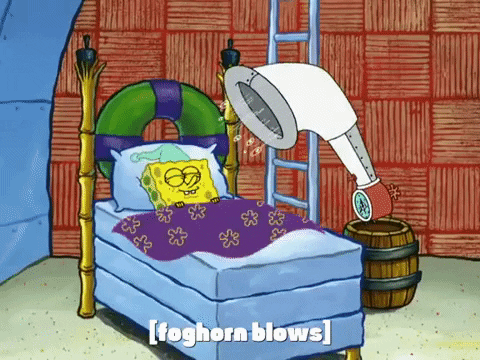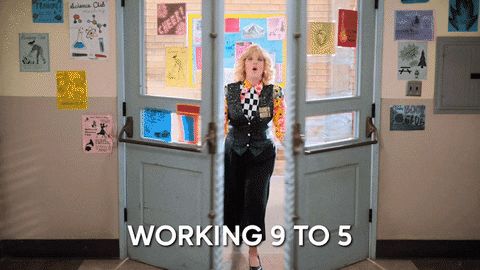If you enjoy this newsletter, you can buy me a coffee on Ko-fi
It’s that time of the year when people share the good habits they want to bring into the new year. A common New Year’s Resolutions, and one I always find particularly interesting, is the promise to become “a morning person.”
The idea that there are only two types of people - a morning person and a night owl is flawed to start with, but the fact that one is considered superior to the other is even more grating to me.
Hustle harder
For years, we've listened to CEOs and entrepreneurs preach about the value of an early start. A few years ago, Apple boss Tim Cook proudly shared his 3.45 am wake-up time, while Richard Branson treats himself to a lie-in until 5.45 am.
Since then, the notion of getting up early has been synonymous with success. And, for around half the population, this is an easy goal to achieve. But what about people who struggle to crawl out of bed by midday? Never mind hit the gym, drink a smoothie and take a shower before sunrise. Are those people inherently worth less? Are they lazy and, ultimately not as successful as the prior? Or is it just that society needs to accept that we are all different?
Not everyone can (or should) be a morning person
Since his ADHD diagnosis at the age of 29, my husband Craig has discovered that many facets of his personality that made him feel lazy or even inadequate are, in fact, symptoms of his neurodivergence. Around 75% of adults with ADHD experience a delayed sleep cycle, which affects both how quickly they can fall asleep and how early they wake up. This is just another way in which it’s more difficult for neurodivergent people to operate, and ultimately succeed, in our current society.
The whole concept of a 9-5 working day is pretty ableist. It’s a work structure that only satisfies a small number of people. Those who find it difficult to rise and shine are shamed into thinking they aren’t good enough. This is one of the many reasons why the disabled employment rate in the UK sits at just 52%, compared to 81% for non-disabled people.
It’s clear that employers still aren’t doing enough to accommodate the wide variety of individual needs, and the inflexible working day is just one way that disabled people are discriminated against in the workplace.
Even among the neurotypical population, many of us struggle to get up in the morning, particularly during the winter months. There are several scientific reasons why this is the case, including the fact that we produce melatonin over a longer period during winter nights. While lower levels of vitamin D (caused by less sunlight) can impact serotonin levels affecting both our sleep-wake cycle and our mood - hence the prevalence of Seasonal Affective Disorder (SAD.)
Does the early bird really catch the worm?
Keeping all of the above in mind, why does society still champion getting up early and shame those who struggle to do so? Of course, contentment isn’t profitable. Even in a world of body acceptance and anti-hustle culture, you’ll still find brands and influencers harnessing your deepest insecurities to shill products or causes.
Is there any truth in the idea that morning people achieve more? With the risk of sounding like Molly-Mae, we do all have 24-hours in the day. And while the idea that we could all achieve the same success in that time is both ignorant and downright offensive, I do think it’s unfair to suggest that morning people have more time to achieve their goals.
There are a lot of factors that affect your daily output - like financial situation, mental health, disabilities, domestic situation… to name but a few. But, the time of day in which you do the stuff that you can manage really doesn’t make a difference… it’s just less insta-worthy if it’s dark when you write your newsletter (like me, right now).
In reality, you can grow a business, smash goals and reach new heights at any time of day… and that’s coming from a morning person. Well, not a 3 am-smash-the-gym-and-a-green-juice morning person, but I definitely consider 9 am to be a lie-in and rarely go to bed after 10 pm.
Living with Craig, a true night owl, for over eight years has shown me first-hand that you can achieve just as much regardless of what time you get up. If anything, forcing yourself to ‘become a morning person’ when your body simply doesn’t want to be one is likely to make a negative impact on your sleep cycle and mental health.
Because our sleep cycles are so ingrained in our psyches, it takes a lot of time and effort to change them. And, for some people, it’s impossible to make that shift. Despite that, it’s now 2022 and I am still seeing people setting New Year’s Resolutions that involve making these unattainable changes that will likely end in feelings of inadequacy and failure.
Stop setting yourself up to fail. Instead of trying to become a different person in 2022, why not take this time to work out your optimum way of life? Maybe, you’ll learn that midnight is when your creativity peaks, and you’d rather catch up on sleep in the morning than force yourself to work when it feels like walking through treacle. Of course, all of this relies on you having a job that allows for these concessions, which is something a lot of people are not fortunate enough to have.
Whatever your ideal day looks like, remember that no two days are the same. Something that seemed easy last week might be difficult now, and vice versa. The conclusion of this rather hefty piece is that the only way to ‘succeed’ is to get to know yourself better and take steps to accept what you learn, rather than striving to achieve something that’s impossible, thus setting yourself up for failure from the start.
Are you a morning person or a night owl? Have you ever been made to feel bad for being one over the other? Let me know on Twitter @ContentByTheSea or reply to this email for a confidential chat.
📽️ Touching the Void (Prime Rental) - After enjoying 14 Peaks: Nothing is Impossible a few weeks ago, Craig remembered this documentary he’d watched in film studies about a pair of British climbers who attempted an absolutely terrifying and near-fatal ascent of Siula Grande in the Peruvian Andes in 1985. Even though this doc was made in the early-2000s, it really has stood the test of time. I can’t recommend it enough… I don’t think either of us touched our phones for the entire 106-minute running time - a sign of a great flick in 2022.
📺 Euphoria (S2 - NowTV) - US drama about the wild antics of a group of Gen-Z kids is back and crazier than ever. Just because it’s marketed as a high school drama, don’t go into this expecting Mean Girls 2.0. It’s often a difficult watch and covers very sensitive topics, but worth watching if you like that sort of thing.
That’s all from me this week. See you next Wednesday for more thoughts on mental health and work culture in the online world.
Ellen x
✨ People saying nice things about Conversations By The Sea



Enjoyed this? You might like these past issues:
15 December: How do you compare?
8 December: Lessons on mental health from Henry Cavill
1st December: Give the gift of rest this Christmas
24 November: Who are you?
17 November: Christmas comes early








